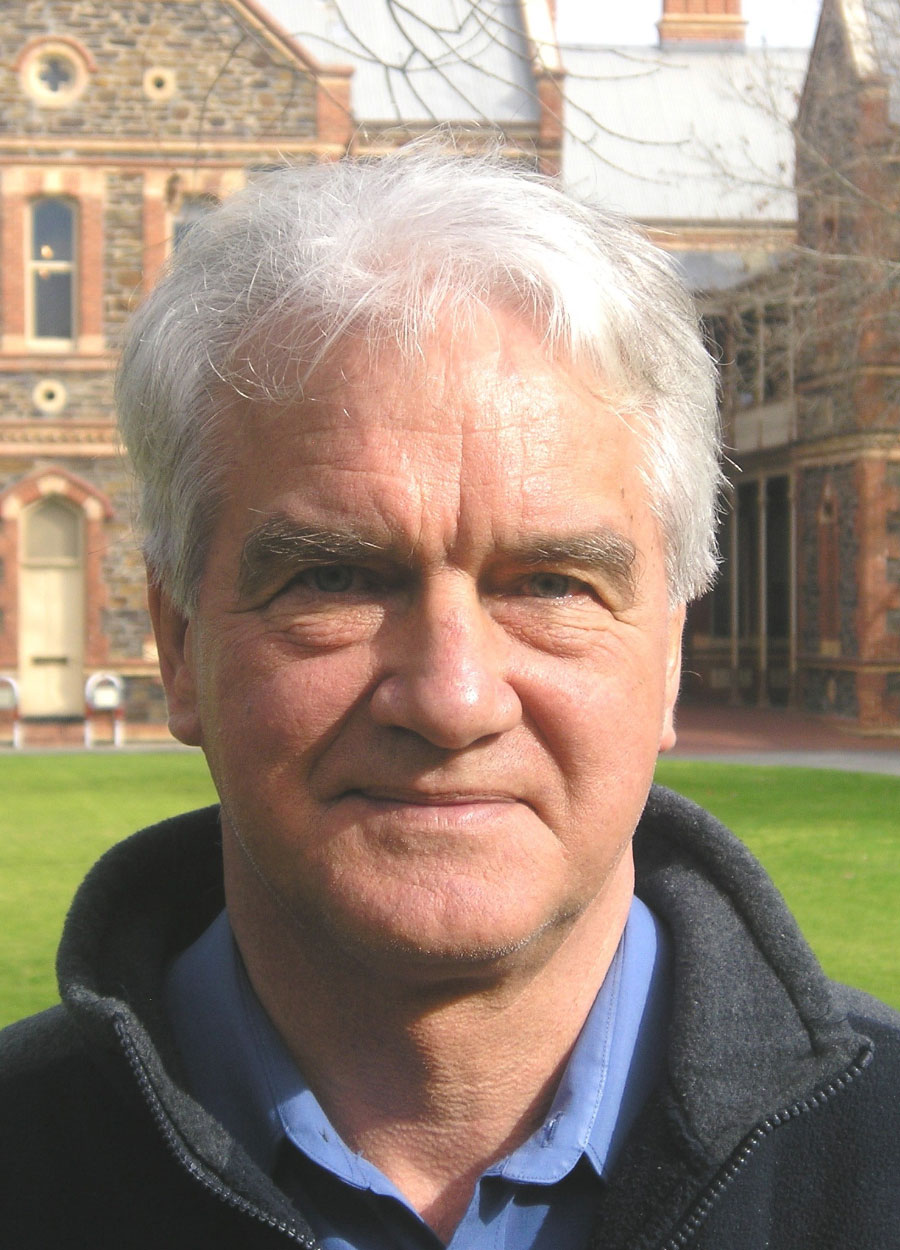About

After serving as a lecturer at the Australian Lutheran College, formerly Luther Seminary, since 1982, John Kleinig retired from full time teaching at the end of 2009. He was born in 1942 and grew up on a farm in the Barossa Valley which may account for his love of red wine.
After finishing high school at Immanuel College where he was head prefect, he studied at the University of Adelaide for a BA Honours in German language and literature from 1961-1964. There he developed an interest in German lyric poetry and Lutheran hymnody and an abiding fascination for Georg Hamann as a cultural analyst and critic of the Enlightenment. His thesis was on the sonnets of Andreas Gryphius for the liturgical year. Those studies influenced his later literary orientation as a Biblical exegete as well as a passion for the church’s liturgy and hymnody.
After the first stage of his theological studies at Immanuel Seminary from 1965 to 1967, he was one of the seventeen students in Luther Seminary’s first graduating class in 1968. After his ordination in 1969 he was called to serve as chaplain at Luther College, Melbourne (1969–72) and later at St Peter’s College, Brisbane (1973–79). Then followed postgraduate studies for an MPhil in Cambridge with a thesis on the getting of wisdom in Proverbs and a call to the faculty of Luther Seminary, where he began teaching in 1982. Since then he has taught courses on Hebrew, introduction to the Bible, introduction to Old Testament exegesis, Psalms, wisdom literature in the Old Testament, Old Testament theology, worship in the Old Testament, preaching, introduction to worship, Lutheran liturgics, and Lutheran spirituality. Generations of students have benefited from the clarity, conviction and liveliness of his biblically-grounded presentations.
Along the way, John completed a PhD from the University of Cambridge. His dissertation, ‘The Lord’s song: the basis, function and significance of choral music in Chronicles’ (1990) begins with a memorable paragraph in which John acknowledges the inspiration he received from J S Bach.
At 2 Chronicles 5:13 in his copy of the Calov Bible Commentary, J S Bach adds the marginal gloss: ‘God is always present with his grace in devotional music’. This is not an isolated comment but is connected thematically with two other comments.
In response to Calov’s remarks on 1 Chronicles 25:1, that the temple musicians were to proclaim God’s word in the composition of their psalms and sing them to the accompaniment of musical instruments, Bach declares, quite emphatically, that this chapter was the true foundation for all God-pleasing music. The reason for this is given at 1 Chronicles 28:21 where Calov had remarked that David had not arranged the temple and its services on his own initiative but rather at the Lord’s instruction. Bach notes there that, through David, God’s Spirit had instituted church music together with all the other aspects of the divine service at the temple. Bach thus was influenced by Chronicles in his understanding of liturgical music. It had been instituted by God himself to proclaim his word and grant his gracious presence to his people in their worship of him.


This shows some of his main concerns as a scholar- his interest in the divine service and the role of church music, both ancient (Psalms, Chronicles) and modern, in the performance of praise, but also his love for Bach and deep respect for the Lutheran Orthodoxy (Calov) which supplied Bach’s inspiration.
Even though he is by training an Old Testament theologian, he worked at the pastoral and practical application and integration of all the classical theological disciplines. He therefore regards himself as a pastoral theologian. The focus of his research and writing has been on the divine service and on Lutheran spirituality. Thus in his commentary on Leviticus he explores how the people of God share in his holiness through their participation in the divine service. The aim of this commentary is to help missionaries who work with people in animist cultures, young people who battle against the threat of spiritual pollution, and orthodox Christians who love the Lord’s house, to discover the riches of the divine service from their study of Leviticus. While he introduces Christians to the gift of prayer in a congregational study on Prayer: we speak to God in order to encourage them to pray with boldness and confidence together with Christ, he investigates the nature and practice of evangelical piety more fully in Grace Upon grace: spirituality for today. This study of the practice of receptive spirituality deals with the disclosure of Christ’s presence with us in our journey here on earth, meditation on God’s word for the reception of the Holy Spirit, prayer in the name of Jesus, vigilance in spiritual warfare, and participation in Christ’s holiness in our hidden journey through life with him. As a companion piece to Leviticus he has also written a commentary on Hebrews in which he shows how that letter is a written sermon for a service of worship that explains what is happening in that service and encourages the congregation to make good use of the access that they have to God’s presence in heaven through Jesus, their great high priest. He has also published a book on the Biblical theology of the human body, an English translation of the London writings of J. G. Hamann, and handbooks on the Bible and the Lord’s Supper.
John has served the Lutheran Church of Australia in a number of official capacities. He has been a member (1983-2009) and chairperson (1993-2006) of Commission on Worship; a member (1990-1993,1997-2009) and vice chairperson (2003-2009) of the Commission of Theology and Interchurch Relations; a Lutheran representative on the Australian Consultation on Liturgy (1992-2003); and a member of the Lutheran Reformed Dialogue (1982-1996) and its co-chairperson (1992-1996). His long involvement in the Commission of Worship culminated in the preparation and production with others of Church rites (edited by David Schubert, Openbook Publishers, Adelaide, 1994), Rites and resources for pastoral care (edited by David Schubert, Openbook Publishers, Adelaide, 1998), and LCA worship resources (Lutheran Church of Asutralia, North Adelaide, 1998-2001).
John’s reputation as a scholar has opened up numerous avenues for him to teach in the USA, Canada, India, South East Asia and South Africa. This has led to his active involvement as a speaker in Doxology which is a Lutheran centre in the USA for the provision of spiritual care and counsel to pastors. In his retirement he has continued to write extensively, teach in Australia and overseas, translate, and provide care and counsel.
On October 4, 2013 John was honoured with a Festschrift entitled You My People Shall Be Holy. It was edited by John R. Stephenson and Thomas M. Winger and published by Concordia Lutheran Theological Seminary, St Catherines, Ontario, Canada. In 2014 John received an honorary DD from Concordia University.
John is married to Claire, a church musician and retired teacher. They have four children and ten grandchildren. His hobbies are fishing, gardening, reading novels, viewing films, and doing nothing.
At a Glance
- Birth on 14 July 1942 at Kapunda as the fourth of eight children.
- Secondary schooling at Kapunda High School (1956) and Immanuel College, Novar Gardens (1957-1960).
- Tertiary study at Adelaide University for BA (Hons) from 1961-1964.
- Theological and pastoral training at Immanuel Seminary from 1965-1967 and Luther Seminary in 1968 at North Adelaide, South Australia.
- Chaplain and teacher at Luther College, Melbourne, Victoria, from 1969 to 1972.
- Senior Chaplain at St Peters Lutheran College, Brisbane, Queensland from 1973 to 1979.
- Study for a MPhil at Cambridge University from 1979 to 1981 and for a PhD in 1989.
- Lecturer at Luther Seminary/Australian Lutheran College from 1982 to 2009.
Qualifications
- BA(Hons) (University of Adelaide, 1965)
- MPhil (Cambridge, 1982)
- PhD (Cambridge 1991)
- DD (Concordia Theological Seminary, Fort Wayne, 1998)
- DD (Concordia University, Irvine, 2014)
- Ordained 5 January 1969 (Christ Church, Murray Bridge SA)
ALC positions held
- Lecturer in Biblical studies
- Head of the Biblical Department
- Dean of Chapel